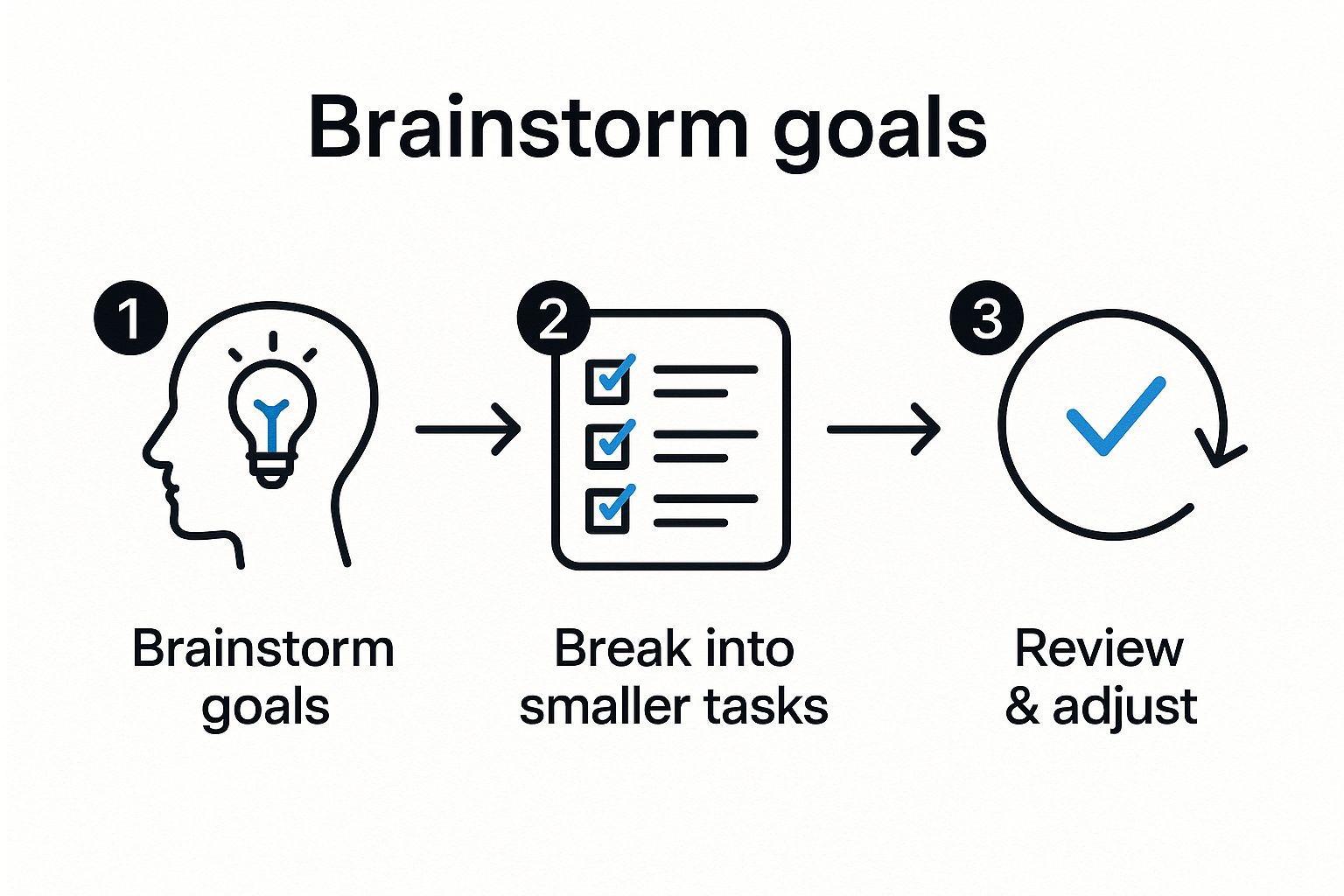Setting goals with a teenager isn't just another box to check. It's about giving them a rudder in the often-stormy seas of adolescence. It’s a skill that provides direction, builds real resilience, and gives them a sense of control when so much of life feels out of their hands.
By breaking down big dreams into small, concrete steps, you can help them create a roadmap that turns those "someday" ideas into reality. This isn't about adding pressure. It’s about empowering them.
Why Goal Setting Is a Lifeline for Modern Teens

The teenage years are a whirlwind. Academic pressure, social circles, and the giant, looming question of "what's next?" can feel completely overwhelming. For a lot of teens, that uncertainty is paralyzing, leading to procrastination and a total lack of motivation, especially when it comes to school.
This is where goal setting becomes more than just a good habit. It’s an anchor.
Having clear objectives gives them a sense of purpose that can genuinely improve their mental well-being. Instead of feeling adrift, they have something tangible to work toward. This structure is a powerful antidote to anxiety, giving them a feeling of agency over their own lives. As a parent, the key is to frame this as a collaborative journey, not just another chore on their list.
Building a Framework for the Future
Today’s teens are navigating a world that’s more complex than ever. Recent OECD research highlights just how widespread anxiety about future careers has become, with many feeling completely lost. The study even found that a teen’s family background often has more influence on their career goals than their actual academic performance. This points to a real need for guidance at home.
By helping your teen figure out what truly matters to them, you empower them to see beyond these external pressures and expectations. This is where you can connect them with resources that offer positive guidance and mentorship.
A well-defined goal, no matter how small, can be a source of immense strength. It teaches teens that progress, not perfection, is the objective and that setbacks are just part of the journey toward building a resilient future.
This process also opens the door to important conversations about well-being and managing stress. A simple meditation guide for teens, for instance, can become a practical tool in their back pocket. If you're looking for more ways to support their emotional health, our guide on teenage mental health awareness offers practical advice to get started.
Parenting Tip: Start with Trust, Not a To-Do List
Before you can even start talking about goals with a teenager, you have to build a foundation of trust. It’s that simple. If they feel like they’re walking into an interrogation or a lecture, they’ll shut down immediately. The goal here isn't to map out their entire future for them, but to create a safe space where they can explore what they actually care about without the fear of getting it "wrong."

This whole process has to start with curiosity, not direction. Instead of hitting them with the classic, "So, what do you want to be when you grow up?" try something more grounded in their actual life. Ask, "What was one thing you did this week that made you feel genuinely excited or energized?" That little shift changes everything. It turns a potential grilling session into a real conversation and lays the groundwork for them to discover what truly drives them.
Connecting Passions to Pathways
A teenager's current interests, no matter how random or unproductive they might seem to you, are actually goldmines. They're clues to what motivates them on a deeper level. Your job isn't to judge those interests, but to be a detective—helping them connect the dots between what they love doing and the skills they're building. This validates their passions and shows them that goals aren't just chores assigned by adults; they're extensions of what they already enjoy.
- Got a gamer in the house? Their love for video games is so much more than screen time. It’s about rapid problem-solving, strategic planning, and often, complex teamwork. This could be a natural bridge to exploring coding, graphic design, or even project management.
- Is your teen a social advocate? If they’re fired up about climate change or social justice, help them find a way to act on it. A local volunteer opportunity can turn that abstract passion into real-world experience.
- What about the creative kid? If they're always drawing, writing, or making TikTok videos, encourage them to take it a step further. They could start building a portfolio, launch a blog to share their work, or enter a local arts contest.
When goals are tied to something they already care about, the motivation comes from within. It’s not something you have to force. Suddenly, it feels self-driven, not parent-mandated. The first step in this whole journey is helping them see themselves more clearly. To go deeper on this, check out our guide on how to improve self-awareness.
Building Mental and Emotional Readiness
Let’s be honest: procrastination and a lack of motivation usually aren't about laziness. More often than not, they’re symptoms of feeling completely overwhelmed. A huge part of getting a teen ready to set goals is helping them build mental resilience first. Research even shows that when teens connect a goal to a "why"—especially a purpose bigger than themselves, like helping others—their motivation skyrockets.
A supportive environment is everything. When teens feel like they can explore their identity and values without being judged, they're far more likely to actually buy into the goal-setting process with genuine enthusiasm. They take ownership.
This is also the perfect time to give them some practical tools for their mental toolkit. A simple meditation guide designed for teens can give them the skills to manage stress and stay focused when things get tough. This is especially important for teen boys, who are often taught to bottle things up. Creating spaces for open conversation is key. Resources like mentorship programs or groups for young men can provide positive role models and a support system that makes it okay to ask for help—a solid foundation for chasing any goal.
How to Make SMART Goals Actually Work for Teenagers
The classic SMART goal framework—Specific, Measurable, Achievable, Relevant, and Time-bound—is a solid starting point for just about anyone. But let's be honest, for a teenager, it can feel like a stuffy corporate exercise. It needs a refresh to feel less like a homework assignment and more like a personal game plan.
Getting this right can be the difference between a goal that fizzles out after a week and one that genuinely sparks motivation.
Vague goals like "get better grades" are motivation killers. They're overwhelming because they don't offer a clear first step. This is where you, as a parent, can step in and help your teen translate that fuzzy wish into something real and actionable.
This infographic breaks down the process of turning a big idea into a manageable plan.

As you can see, setting a good goal isn't a one-time thing. It’s a cycle of brainstorming, planning, doing, and adjusting along the way.
From Vague to Victorious: Making Goals Specific and Measurable
Instead of "do better in math," a SMART goal digs into the details. A Specific goal sounds more like, "I want to raise my Algebra grade from a C+ to a B+." Right away, your teen has a clear target to aim for.
From there, you make it Measurable. How will they know they're on track? By defining the actions. For example: "I'll get a B+ in Algebra by going to the after-school tutoring session every Tuesday and finishing my homework before 9 PM each night."
Suddenly, progress isn't just a vague feeling—it's something they can see and track. This small shift is backed by a surprising amount of research. Studies show that setting specific, challenging goals dramatically improves performance. In fact, people who write down their goals and create clear, actionable plans are nearly 75% more likely to succeed. You can dig into more of the goal-setting statistics that prove just how powerful this is.
Keeping It Real: The 'Achievable' and 'Relevant' Check
This is where the rubber meets the road for teens. A goal absolutely must feel Achievable, or they'll get discouraged and quit before they even start. If your teen wants to save $1,000 for a new guitar but has no job or allowance, that goal is dead on arrival.
The key is to break it down. Help them reframe it into smaller, winnable steps, like "save $50 a month by taking on extra chores and finding a weekend babysitting gig." Now it feels possible.
Even more importantly, the goal has to be Relevant—to their life and their dreams, not yours. This is where your guidance can make all the difference.
A goal without personal meaning is just another chore. The real magic happens when you help your teen connect the dots—showing them how acing that science class opens the door to a video game design career they're excited about, or how saving that money leads to the freedom they crave.
Finally, putting a deadline on it makes it Time-bound. A simple "by the end of the semester" or "before summer vacation starts" creates a healthy sense of urgency and turns a fuzzy "someday" into a concrete finish line.
To see this in action, check out how we can transform some common teen goals from vague ideas into powerful, actionable plans.
SMART Goal Makeover for Teens
| Vague Goal | SMART Goal Example |
|---|---|
| "I want to get better at basketball." | "I will make the varsity basketball team next season by practicing my free throws for 20 minutes three times a week and attending the summer skills camp in July." |
| "I should save more money." | "I will save $300 for a new pair of sneakers by my birthday in three months by setting aside $25 from my weekly allowance and part-time job." |
| "I need to do better in school." | "I will improve my GPA from a 3.2 to a 3.5 by the end of the semester by studying for 45 minutes every school night and turning in all my assignments on time." |
| "I want to be healthier." | "I will improve my fitness by running a 5K race in May. I'll train by following a beginner's running plan three times a week and swapping soda for water on weekdays." |
See the difference? The goals on the right provide a clear roadmap, making it much easier for a teen to get started and stay motivated.
A Quick Note on Supporting Teen Boys
For a lot of teen boys, the pressure to have it all figured out can make it tough to set goals, let alone ask for help when they're struggling. It's incredibly important to create a home environment where it's okay to be vulnerable and talk about fears of failure.
Sometimes, outside support can make a huge impact. Resources like men's groups or mentorship programs offer positive role models and a safe space to talk through things like procrastination and self-doubt. These support systems are invaluable for helping young men build the emotional resilience they need to go after their goals with confidence.
Navigating Procrastination and Motivation Slumps
Even the most driven teen is going to hit a wall sometimes. That's just part of being human. Motivation isn't some endless well we can just keep drawing from; it comes and goes. When you see your teen procrastinating, especially with school work, it's rarely because they're "lazy." It’s almost always a sign of something deeper—they're feeling overwhelmed, terrified of failing, or just have no idea where to even start.
Your job isn't to be a drill sergeant barking orders. It’s to be a guide. The most important thing you can do is help them see that these slumps are completely normal. Teaching them that setbacks are okay and helping them build resilience is a thousand times more valuable than pushing for perfection. It’s all about shifting the focus from the big, scary outcome to the small, steady progress they can make right now.
Parenting Tip: Defeat Procrastination with Micro-Steps
When a goal feels massive, that first step can seem like a sheer cliff face. This is where a few simple, powerful techniques can make all the difference. One of my absolute favorites is the 'Two-Minute Rule.' The whole idea is to shrink a task down into something that takes less than two minutes to get started.
Instead of the vague command to "study for my history final," the two-minute version becomes, "open my history textbook to the right chapter." Instead of the dreaded "clean my room," it's "put five things away." This tiny action is just small enough to bypass the brain's natural resistance, and once the momentum starts, it's often way easier to keep going.
Procrastination is often just a form of stress relief. When teens avoid a task, they're avoiding the negative feelings associated with it, like anxiety or self-doubt. By making the first step ridiculously small, you remove that initial friction.
Another game-changer is helping your teen break a huge project into 'micro-tasks.' A ten-page research paper isn't a single, monstrous task; it’s a whole bunch of smaller, manageable ones.
- Task: Write a 10-page research paper.
- Micro-tasks:
- Choose a topic.
- Find five credible sources.
- Write a one-paragraph outline.
- Draft the introduction.
- Write one body paragraph.
Every time they check off one of these micro-tasks, they get a small hit of dopamine. That builds confidence and makes the next step feel way less intimidating. For more in-depth techniques, our guide on how to stop procrastinating offers even more practical advice.
A Teen's Guide to Mindfulness and Regaining Focus
Stress and a wandering mind are huge motivation killers. Mindfulness meditation is a scientifically-backed tool that can genuinely help teens manage stress and sharpen their focus. It's not about trying to empty your mind, which is impossible. It's about learning to observe your thoughts without getting swept away by them.
Here's a simple meditation you can share with your teen:
- Find a Quiet Spot: Sit somewhere comfortable, either on a chair or on the floor. Let your hands rest in your lap and gently close your eyes.
- Focus on Your Breath: Just pay attention to the feeling of your breath coming in and going out. Don't try to change it, just notice it.
- Acknowledge Your Thoughts: Your mind is going to wander. That's what minds do. When a thought pops up, just notice it—"Oh, a thought"—and gently guide your focus back to your breath.
- Start Small: Begin with just three to five minutes a day. Doing it consistently is way more important than how long you do it for.
This simple practice helps teens build emotional regulation, a skill that's absolutely vital for navigating life's challenges. To help teens work smarter, not just harder, you might also want to explore some practical strategies for increasing personal productivity.
This journey is especially important for teen boys, who are often taught to bottle up feelings of being overwhelmed. Creating a safe space where they can actually talk about what's going on—and introducing them to supportive communities like men's groups or mentorship programs—can be an invaluable resource as they learn to manage pressure and build healthier ways to cope.
A Guy's Guide to Getting Unstuck

Let's be real: guys often face a weird and complicated set of expectations. Society tells you to be strong, tough it out, and handle things on your own. This can make it feel almost impossible to ask for help when you’re actually struggling with motivation, stress, or just feeling stuck.
This internal tug-of-war can be a huge roadblock when it comes to setting goals for teens. The fear of falling short or not measuring up can feel totally paralyzing. That’s why having a solid network of support—people who actually get it—is a game-changer for building the confidence you need.
It all starts with creating an environment where it's okay to be honest about the hard stuff. For parents, this means making conversations about mental health and resilience normal. Your son needs to know that asking for guidance is a sign of strength, not a weakness.
Finding Your Crew: Resources for Young Men
Sometimes the best support comes from outside your immediate circle. Getting connected with mentors and peers who understand your experience can make all the difference. These communities are safe spaces to figure things out, challenge outdated ideas of what it means to be a man, and learn to express yourself in a healthy way.
Not sure where to start? Check out programs designed for this kind of growth:
- The ManKind Project: This is a global organization that runs some really powerful programs for men of all ages. It’s all about building emotional intelligence and finding a deeper sense of purpose.
- Boys to Men Mentoring Network: This non-profit focuses specifically on providing teen boys with positive male role models and a community of support through school-based group mentoring.
- Local Mentorship Programs: Look into groups like Big Brothers Big Sisters or programs at your local community center. They often pair teens with supportive adult mentors who can offer solid advice.
These groups aren't just about activities; they're about finding a sense of belonging and getting guidance that’s essential for figuring out who you are and where you're headed.
A solid community can change everything. When guys have positive role models and a safe space to talk, they're way better equipped to build the resilience needed to go after their goals with confidence.
Tools for Your Mental Toolkit
Beyond finding a good community, you need practical tools to manage stress and stay focused. Let’s face it, procrastination and motivation slumps are often just symptoms of feeling anxious or completely overwhelmed.
A simple mindfulness practice can be surprisingly effective. Think of it like a workout for your brain.
Here’s a quick guide to get started:
- Find a Spot: Just sit somewhere quiet and comfortable for three to five minutes. That’s it.
- Focus on Your Breath: Don't try to change anything. Just notice the feeling of your breath going in and out.
- Let Thoughts Pass: Your mind will wander. When it does, just notice the thought without judgment and gently bring your focus back to your breath.
This simple exercise is a powerful way to build focus and learn to regulate your emotions. For more in-depth mental health support, organizations like the National Institute of Mental Health (NIMH) offer excellent, research-backed resources for both teens and parents.
By combining a strong support system with practical mental tools, you can build a solid foundation for a healthy, successful future.
Common Questions About Teen Goal Setting
Guiding your teen through setting their own goals can bring up a lot of questions. One minute you're dealing with a total lack of motivation, the next you're trying to manage sky-high ambitions. It's totally normal to feel a bit lost on how to best offer support.
The real key is to shift your role from manager to mentor. Instead of laying out their path for them, you’re helping them build the tools to navigate it themselves. This approach is everything when it comes to fostering independence and making sure the goals actually feel like their own.
How Do I Help a Teen Who Has No Idea What They Want?
When your teen hits you with the classic, "I don't know," it's usually not a sign of apathy. More often than not, it means they're feeling overwhelmed. The best thing you can do here is to focus on exploration over expectation. The goal isn't for them to pick a lifelong career at sixteen.
Encourage them to dip their toes into low-stakes activities without any pressure for a long-term commitment. Think a weekend coding class, a few hours volunteering at an animal shelter, or joining a new club at school. These things can spark curiosity in unexpected ways.
Ask open-ended questions like, "What was one thing you learned today that surprised you?" This helps build their confidence and allows them to discover what truly lights them up.
Their mental well-being is always priority number one. If your teen is struggling, frame goals around self-care, like 'Meditate for five minutes three times a week.' These aren't about high achievement; they're about building routines that support their mental health and recovery.
And if you're facing unique challenges or questions that feel a bit out of your depth, don't be afraid to seek expert advice. Sometimes, a neutral third party can provide the breakthrough you both need.
What if Their Goal Is Totally Unrealistic?
First things first: validate their ambition. Starting with something like, "Wow, that's a huge goal! I love that you're thinking big," keeps the conversation open and positive. This is crucial for setting goals for teens without accidentally crushing their spirit.
Then, you can gently help them reverse-engineer that big dream. Try asking questions that get them thinking practically:
- "What would be the very first step toward making that happen?"
- "What kinds of skills do people who do that for a living have?"
- "How could we break this massive goal down into smaller, more manageable pieces?"
This process isn't about telling them "no." It's about grounding their big idea in a real, step-by-step plan and showing them how it could be possible.
How Can I Support a Teen Struggling with Motivation?
Procrastination and a lack of motivation are often symptoms of something deeper, like anxiety or a paralyzing fear of failure. It's especially important to provide a strong foundation of support for teen boys and young men, who often feel immense pressure to handle everything on their own without asking for help.
Introduce them to practical tools that build resilience from the inside out:
- A Simple Meditation Guide: Even just five minutes of mindfulness can work wonders for managing stress and sharpening focus.
- Supportive Communities: Resources like The ManKind Project or local mentorship groups can offer safe spaces and positive role models, helping young men build confidence and emotional strength.
When you address their mental health and provide a solid support system, you empower them to tackle their goals from a place of genuine strength, not just willpower.
At Andrew Petrillo Life Coaching, we specialize in helping teens and young adults turn that feeling of overwhelm into clear, actionable plans. If your teen is struggling with motivation, procrastination, or just finding their direction, a personalized coaching plan can provide the structure and support they need to really thrive. Discover how we can help by booking a complimentary discovery call today. Learn more at https://andrewpetrillolifecoaching.com.



















